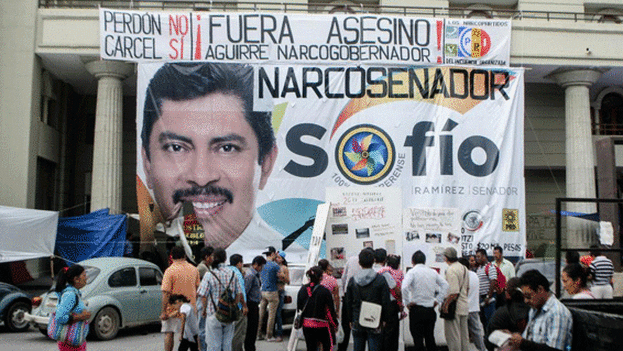
14ymedio, Carlos Malamud, October 20, 2014 — The regrettable events of Iguala and the disappearance (probably slaughter and disposal) of 43 student teachers (school teachers) again have Mexico facing its greatest scourge of the 21st Century: violence. The triumph of PRI in the elections of 2012, Enrique Pena Nieto’s ascent to power and his reformist program seemed to have redirected the country on a different course than the six-year term of Felipe Calderon (2006-12) and his war against drug trafficking.
Suddenly the dam has burst, and Mexicans have been newly submerged in a black nightmare. Everything is again in question, like governability, the burden of drug trafficking, corruption and civic coexistence. Pena Nieto does well to worry because in this wager an important part of his government and of the memory that he leaves future generations is at play. The worry should reach the whole range of national politics and all levels of government, beginning with the federal, but also the municipal and state.
It is not an easy or a simple problem as proven by the recent history of Colombia, where the mixture of political violence and narco-trafficking aggravated the situation. But in Mexico things are no simpler. The proximity of the United States implies not only a vast market for drugs but also a relatively simple path for arms procurement. Political violence is quite residual and absolutely comparable to the Colombian, and at the moment stable ties have not been established with the cartels.
Its current fragmentation complicates even more the fight by state forces. The fierce fight that the gangs maintain to impose their territorial control increases the violence, the number of victims and the sense of danger that they transmit. In order to achieve their objectives, not limited to narcotics trafficking, they try to tie themselves increasingly to local power, corrupting it to the roots where they can.
The mayor of Iguala, Jose Luis Abarca and the governor of Guerrero, Angel Aguirre, both belong to the PRD (Democratic Revolutionary Party)
Their work is facilitated in those states, like Guerrero, where inaction or a certain complicity by governors aids the criminal objectives or does nothing to eradicate the cancer of corruption and the ties between the drug traffickers and the local police. This is only the beginning. The weakness of some institutions such as the justice or incarceration systems favors greater territorial implantation of organized crime.
The case of Iguala affects all Mexican political classes and the main national parties, beginning with the PRD (Democratic Revolutionary Party) which both the mayor of Iguala, Jose Luis Abarca — who has skipped town with his wife — and the governor of Guerrero, Angel Aguirre, belong to. It is necessary to involve the three major national forces (PRI, PRD and PAN) in order to establish the basis for a deep civic regeneration. Some think that by not taking significant steps in this sense there would be unpredictable consequences. At the moment conditions for a widespread explosion in calls for greater security are not seen, in spite of there being a very extensive social demand, especially where the scourge of crime and narco-trafficking is greatest.
Until now Pena Nieto has not been greatly affected by the events. After a certain initial delay in taking a more pro-active posture to resolve the case, he has moved with a certain ability. The dispatch of the Gendarmeria – a division of the national police – and the capture of Sidornio Casarrubias, chief of “United Warriors,” presumed responsible in complicity with the municipal authorities and police for the kidnapping of the teachers, are points to his credit.
The Mexican criminal justice system must be reformed. Its labyrinthine intricacies are the best guarantees of impunity
But a good part of Pena Nieto’s future will depend on the path that he follows going forward, especially when the teachers’ cadavers appear. This is a golden opportunity to promote a deep reform of institutions tied to security and the fight against drug trafficking. In spite of dealing with a complex and slow process, it is urgent to finish the commissioning of the Gendarmeria and the purging of many police agencies. At the same time, the Mexican criminal justice system must be reformed. Its labyrinthine intricacies are the best guarantees of impunity for criminals, especially those who can pay good lawyers.
The work is not easy. There are many who profit from the status quo or try to take advantage of the difficulties of the system, as much among the accomplices of the drug trafficker as on the extreme left. But the moment demands conclusive answers. A common expression among youth close to the drug traffickers says: “Better to live five years as a king than 50 years as an ox.” Five years is the life expectancy for the henchmen close to the cartels. The Salvadoran and Honduran gangs are too close to forget their example. If this spreads, Mexico’s future will not be quite as promising as it appears today.
Editor’s note: This analysis has been previously published on the site infolatam. We reproduce it with the author’s permission.
*Carlos Malamud is a researcher for the Elcano Institute of International Studies and Strategies.
